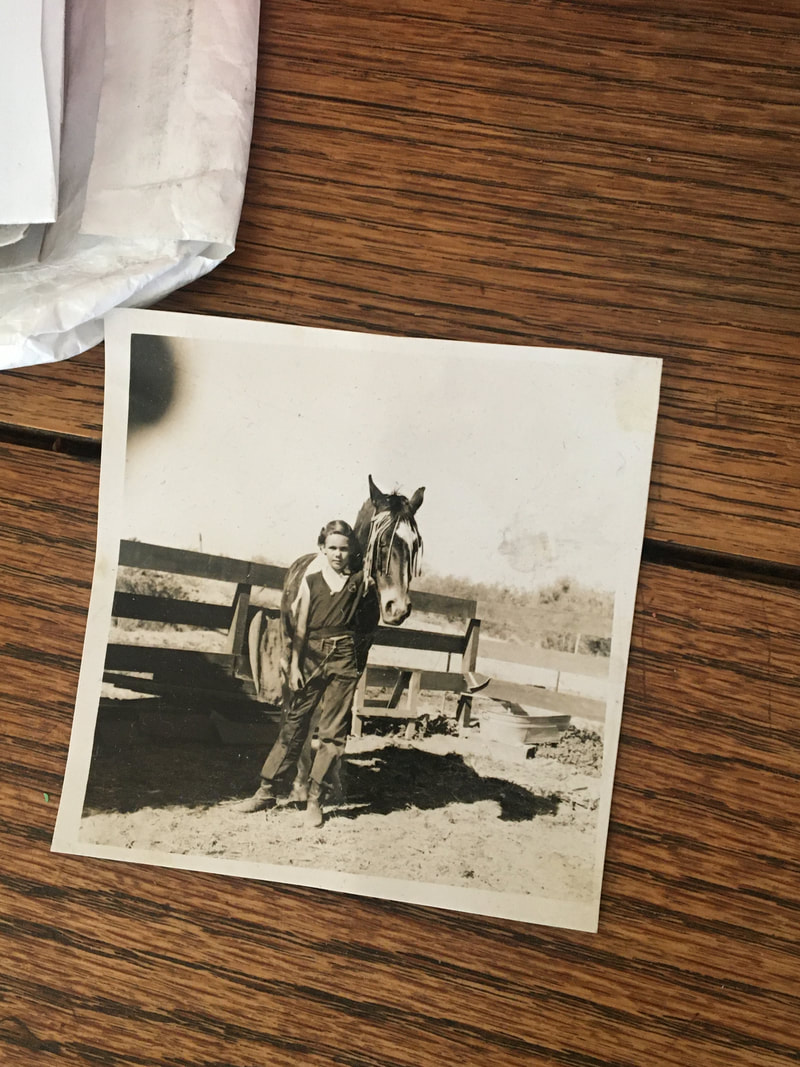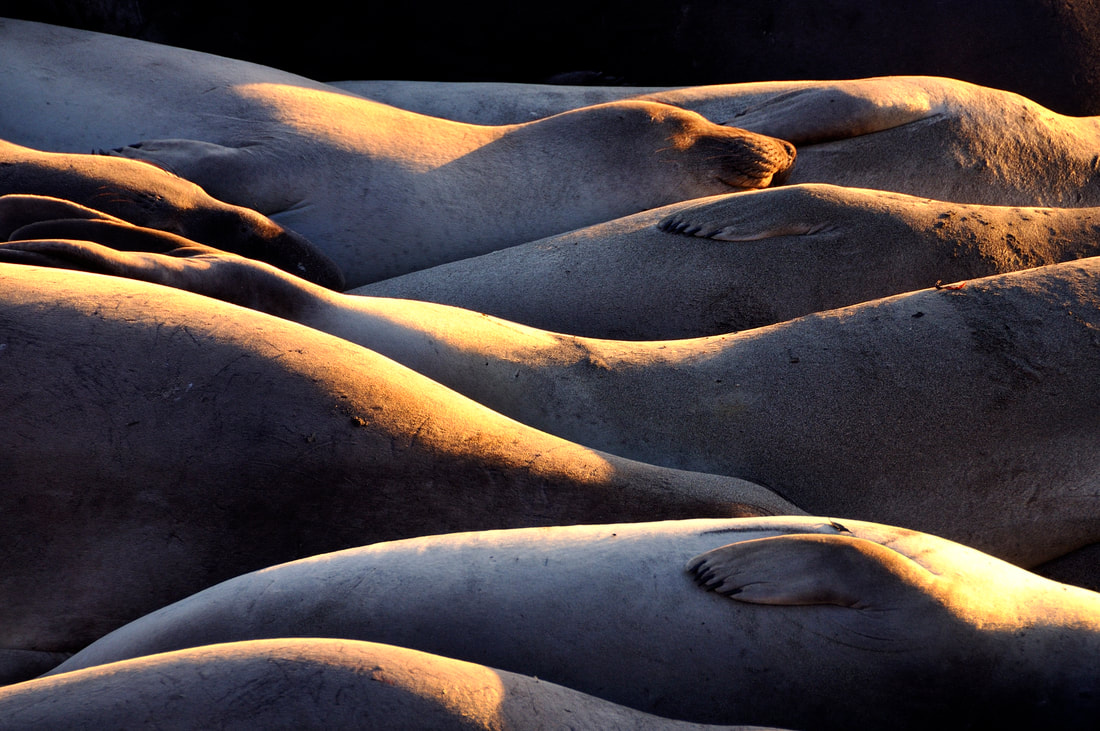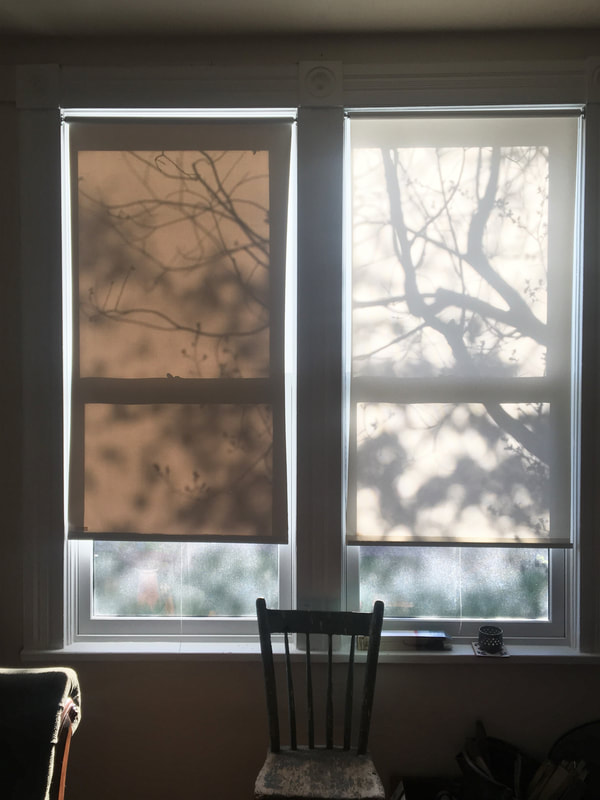|
Let’s face it, attraction can be very attractive. And disastrous. Right now I’m going to focus on the attractive. My friend, Callie, came over the other day to cut down a tree in my yard. She would correct me here and use the word “fell,” fell a tree. Well, we felled it alright. She did. My job, because I don’t use a chainsaw, was to pull on the rope people pull on in order to get the tree to fall in the perfect spot. So I was the linesman and she was the sawyer, and together we felled that tree that wasn’t really a tree but a sucker from the old apple twenty feet away that looked deathly this spring. I guessed the sucker belonged to it and, like an incorrigible child, was stealing its energy. I’m happy to report that the old apple is leafing out more enthusiastically than before.
When we were done, it was time to sit on the grass and enjoy our accomplishment. It was also time to speak frankly about our lives and listen to what came out of our mouths when we weren’t thinking. I heard myself say: “I’ve lost my ability to be attracted to people.” “Really?” said Callie. “That doesn’t seem right.” “I try, but it feels impossible. I miss that energy.” Maybe it will come back, we decided. Maybe that source of energy isn’t needed right now. After all, there are countless sources. But each has its own set of colors and shapes, and the attraction energy is a color and shape now missing from the spectrum. When thinking about it later, after we jumped Callie’s truck, or tried to, and she went off to buy a new battery, then went on her way, I realized I’d spent most of my life occupied with attraction, and for some years now I was actually quite happy to be free of it. I didn’t really think about its absence until I articulated it as a loss. We don’t notice until we do, and often that turning point comes at the moment we feel an emotion about something. We attach an emotion to an event, in this case sadness to lack of attraction, then we’re programmed to think we’ve just located an emotion that was always there. Sometimes that leads to a heightening of the emotion, which is like throwing a welcome home party for a shy person who’d really rather hide in the closet. It was strange, this sudden sadness, this acknowledgement of loss. If a certain energy had gone missing, where was it now? Swimming has always carried the energy of attraction for me. It’s sensual, slippery and visually beautiful, especially that chlorine-blue view from underwater in the pool. Its movements are alternately predictable and wild. People engage in swimming with practically nothing on, but surprisingly, that makes for less attraction rather than more. People under wraps leave us guessing, leave us to dream. Very rarely does a modern bathing suit leave me to dream. I stroke across the pool, feeling at home in my body, wrapped in a kind of aura of attraction. It’s not personal, but pleasant. It doesn’t demand a doing, but reflects a being. As beauty itself is calming, so is the ability to feel attraction. We think the opposite, but remove the urgency (of youth) and underneath, there’s a quiet lake waiting. Writing is a source of that energy of attraction, too. Is it the ability to feel at home in my mind? Is it the groundless feeling of being lifted into language, into the telling of someone else’s story? Is it the respite from self, the floating, the flying outside of time? It’s a sound medium, full of aural pleasure and play. On its best days, the work and act of writing soothes my longing to be heard. It’s a profound way to offer myself, intimacy without the stickiness of reality. But attraction to people? Maybe that’s not what I need anymore. And yet, a few days after Callie came and felled the sucker, I saw a photograph of someone I’d once known, name withheld, and recognized that little buzz of breathlessness, that little sting of longing. I looked up and said to myself, “I’ll be darned. That’s attraction.” Is it back? Is it here to visit? I must admit I kept my enthusiasm in check, for fear of frightening it away.
2 Comments
In this week’s blog I’m passing along a story and photograph from Michael Collier. To go with Michael’s photograph, which goes with his story, I’ve posted a story of my own. "Annie" by Michael CollierI’m curled around my sleeping cat, Annie. Her sleep is troubled. Three or four Decembers ago, Rosey and I camped at Montaña del Oro on the coast near San Luis Obispo. It was birthing time for the elephant seals that brood near Año Nuevo lighthouse. The bulls can weigh 5500 pounds--one ton more than a typical car. The females, weighing only 2000 pounds, are more dainty. But the greatest threat to their small bodies is hypothermia from the cold Pacific water. Their mothers corral them up the waves to dry warm sand. I walked a few hundred yards down the beach and away from the shutterbug crowds the day we were there. A storm had recently roiled the water. I watched as the pounding surf rolled a pup back down from the beach. Its mother barked and flapped to no avail as the pup tried to gain dry ground only to roll waveward again and again. The mother was frantic, unable to help. From fifty feet away, it was hard to be a cold scientist observing evolution and survival of the fittest. The bulls see other males, even younger ones, as a threat to their harem. If disturbed, the bulls have been known to crush hapless pups as they scramble back to the sea. But on the contrary, what I saw was a bull swim up and haul himself comma-like around that flailing pup, preventing it from washing out to sea. The waves were held at bay. I wanted to cry with relief. ****************** Annie doesn't eat more than a bite of cat food at a time now. She drinks a lot of water. She sways without much strength when I pet her. Her eyes drift in and out of a submissive alertness. Once in a while I hear a faint purr--which of course brings a smile and breaks my heart. The vet was probably right when he said that she's in kidney failure. But I don't think about that much when I'm curled around her, trying to keep her from washing out to sea. "Shirley" by Margaret ErhartShe was a Nubian, with long ears and a long pensive face. I used to say she looked like Lauren Bacall. She was black and tan and gave good creamy milk. Once, when my family came to visit the Iowa farm where I lived, she ran from the other side of the pasture, lowered her head and butted my mother hard in the belly. I never saw her do that before or after. She wanted to let everyone know she was my champion.
She grew up in Tucson, in a Maytag washing machine box. She was a wobbly-legged little thing when we first met her on a ranchette outside of Prescott. My girlfriend, Mary, had woken up that morning saying, “Let’s get a camel.” That seemed an unlikely prospect so instead we answered an ad for a goat. At home in Tucson, Shirley lived for a time in the box, then when she outgrew it I cobbled together some pallets to make a little yard for her. Everything went well until weaning time came around. When goats are hungry they do just what human babies do: they bawl at the top of their lungs and don’t stop until food arrives. We reduced her thrice-a-day bottle to one small feeding. We offered plenty of delicious timothy grass and alfalfa and even demonstrated how to eat it, but she would have none of it. Weaning does happen eventually, and at the end of that painful ten days, Mary and I decided our neighbors had earned a Golden Nipple Award. We dipped Shirley’s obsolete bottle nipples in gold paint and attached them to a small square of wood also painted gold, and these we handed out to our three closest neighbors in thanks for their patience during the prolonged ordeal. Shirley grew and grew, and at the end of the summer Mary loaded her into the back seat of her sedan and the two of them drove up to Iowa City. Mary, at least, was bound for the Writers’ Workshop. Her passenger was bound for a real pasture in bona fide farm country. But before they left, there was an incident worth relating here. On the night before their departure, Shirley went missing. We looked everywhere, in every alley, in every back yard around the block. Finally, in desperation, I knocked on the door of our nearest neighbor, an Hispanic man with a withered arm whose name I no longer remember. He called out for me to enter his home, and I did. He was watching television and next to him on the couch was my goat. Later, he told me she had been bleating and he felt sorry for her, especially after her memorable ten days of bawling, so he let her out of her enclosure and opened his door and in she came. He wasn’t expecting her to hop on the couch, but it was companionable and he didn’t mind. A few months later I moved back to Iowa City and joined Shirley and Mary. We bought a little farm and got a few more goats and one sheep who’d been abandoned at birth. He was the only boy around and we called him John. Shirley was definitely the herd mistress, and she did figure out how to open the door of the farmhouse so she could come in any time and pee on the bed. I won’t spend long on this part because it makes me too sad, but she died on a clear, warm Labor Day after opening the door to the feed room and lifting off the lid of the bin where we kept the grain, and eating until her stomach started to burst. She cried in pain for two days, then finally died in my arms. Her big heavy head lay on my lap. We buried her up on the hill above the farmhouse. A few good friends came out and helped us dig her grave. I moved from the farm, and Iowa, shortly after that. As a country, as a people, as Americans, what we lack is balconies. We’ve all heard the stories and seen the visuals. Some of the most poignant images I have from this pandemic are from Italy, a country I love, and more so as it goes through its devastation. There is nothing stopping the Italians. Even a virus. They have always and will forever sing arias from their balconies as the sun goes down. And the Parisians, from three stories up, applauding their medical workers at shift-change. And in Spain, a man on the street improvising a dance with a bag of garbage as he walks it to the bin, while above him, La Scala-style, his audience goes wild.
These balconies are the portal through which apartment-dwellers pass in order to share community. These balconies provide a call-and-response, which is the basic function of community. You say or do, and I reflect you. You sing your aria, and I join you. (Or I throw rotten tomatoes.) Without balconies we can only be observers. Life gets very internal and imbalanced. My friend Gretchen who lives in Paris learned, from her balcony, that her neighbor cries at eight o’clock every evening. Her neighbor comes out on her adjacent balcony to weep, and at first my friend withdrew, wanting to give the woman privacy. One day the woman called across to her: No, please stay. We are more than two meters apart. May we talk? She told Gretchen her husband had died of cancer in early March, a few days before isolation was imposed, and she has had to grieve alone. Every evening now they bring their suppers out on their balconies. They eat together, drink a glass of wine, and talk. Suppertime is the time this neighbor misses her husband the most, and Gretchen asks about him as she eats her arugula salad with brie cheese and a chewy baguette. What was his job? Did they always live in Paris? How did they meet? Were they married long? Are there children? Questions lead to answers, and answers to memories, and memories assuage our longing for those whose hearts stop suddenly and irreversibly, as his did. Balconies create the possibility of response to our call. I grew up in a New York City apartment. New York is a city without balconies. It has front stoops where people sit, and windowsills where people lean, but no one I knew had a balcony. John F. Kennedy was president at the time and he preferred the Carlyle Hotel whenever he visited the city. The Carlyle was right around the corner from where we lived, and the excitement of my young life was to hang out the window of our third-floor apartment to watch the presidential motorcade go by. Kennedy sat in his bubbletop car, the top of his head clearly visible to me and my brothers and sisters. My older sister had once thrown a roller skate out that window and blamed it on my younger brother. In other words, it was a window with history. Kennedy came by once or twice a year, and though our parents had voted for Nixon, we kids thought of him as “our president.” To our way of thinking, we owned him. The top of his head wasn’t seen by many, precisely because America lacked balconies. My friend Laura lives and teaches in Sofia, Bulgaria, and her balcony connects her to the world. Below her on the street, the older men of the neighborhood gather every morning. They stand in a circle, leaning in to hear one another while drinking their coffee. The circle gets smaller and tighter as the morning goes on, until finally they are all in a kind of embrace. She can look down from her balcony at the human scrum, or up and out at the beautiful old buildings of that Eastern European city. These days, the view from where she stands is of her neighbors doing exactly what she’s doing at that isolated moment: drinking coffee, looking out, finding others who share her world: a woman watering her plants; a man feeding a piece of bread to his dog; a mother stepping out to smoke a cigarette. Different lives, connected and divided. The streets are empty but the air is full of balconies. |
AboutA place to discuss writing or anything on your mind. All visitors are invited to join the conversation by commenting on posts, asking questions, and joining the newsletter below for even more opportunities to connect and converse! Archives
April 2023
Categories |




 RSS Feed
RSS Feed